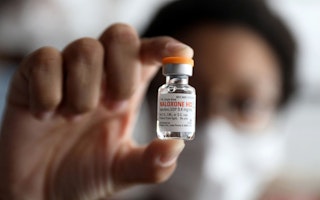Preventing Drug Overdose Is Key in Fight Against AIDS
By Roxanne Saucier
In the United States, there are now more people dying from drug overdoses than from motor vehicle crashes. Many HIV-positive people who use drugs report that overdose is a more urgent concern for them than HIV, and statistics show why. From Vancouver to Vietnam, high proportions of injecting drug users have witnessed an overdose or experienced one themselves. In one city in China, nearly three quarters of drug users interviewed had seen someone die of a heroin overdose. Drug overdose caused approximately 21 percent of deaths among all people living with HIV in Russia in 2007, second only to tuberculosis. For people struggling to meet their daily needs, overdose may present a more imminent threat than AIDS–related illness.
By responding to this concern and providing overdose prevention education and tools, harm reduction programs attract drug users to their other services, including HIV testing, counseling, and treatment. In a publication called Why Overdose Matters for HIV, Open Society Foundations and the Eurasian Harm Reduction Network identify several reasons why people who care about HIV should care about drug overdose.
A recent article in the journal AIDS, by Brown University’s Traci Green and colleagues, calls renewed attention to the overdose-HIV connection. According to research, people who use drugs have a 74% greater risk of overdose if they are HIV-positive compared to their counterparts who are not.
As the article notes, researchers are not sure why this is the case. Is it biological, due to such things as abnormal liver function or respiratory problems in people with HIV? Or is it behavioral? Could high-risk lifestyles and psychiatric co-morbidities explain both overdose events and HIV status among drug users? Or could it be structural: Do factors like incarceration, neighborhood poverty, and homelessness play a significant role?
The authors point out the many shared risk factors for HIV infection and opioid overdose. Clearly more research needs to be done to see which factors matter most, but, given the overlap, scaling up interventions and policies known to reduce risk for one could impact the other.
Green and her co-authors discuss three such interventions: highly active antiretroviral therapy (HAART), an HIV treatment regimen that may also be protective of overdose; medication-assisted addiction treatments like methadone and buprenorphine, which decrease both HIV risk and overdose risk among opioid drug users; and naloxone distribution, which can prevent overdose deaths and connect drug users to HIV prevention and treatment services.
Naloxone is a safe medication with one purpose—to reverse an overdose of heroin and other opioids. It has no potential for abuse and it has no effect on someone without opioids in his or her system. You can read previous blog posts to find out more about this lifesaver.
The Global Fund to Fight AIDS, Tuberculosis and Malaria and the President’s Emergency Fund for AIDS Relief (PEPFAR)—the world’s two biggest funders of HIV programming—have agreed to pay for overdose prevention programs, including innovative ones that distribute naloxone to drug users. This is a positive step but in most countries drug users are still waiting to see these words result in action.
Other international organizations focused on drug users and HIV, like UNAIDS, the World Health Organization, and the UN Office on Drugs and Crime, provide little guidance or assistance to governments when it comes to overdose, despite its toll on drug users, including those living with HIV.
Programs working with drug users should use Green’s paper as evidence when seeking support—from donors and local governments—for overdose prevention initiatives. And for UN agencies and others working to curb deaths among people living with HIV, this should be a wake-up call that advocating for overdose prevention and response is part of their job too.
Roxanne Saucier is a researcher and analyst for the Open Society Public Health Program.

